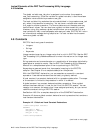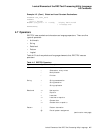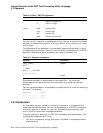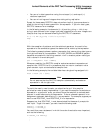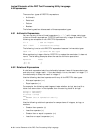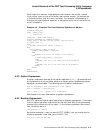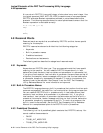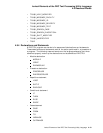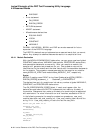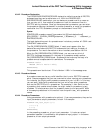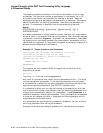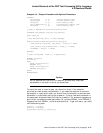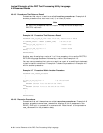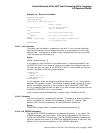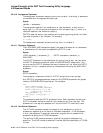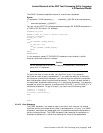
Lexical Elements of the DEC Text Processing Utility Language
4.9 Reserved Words
ENDCASE
• Error statement
ON_ERROR
ENDON_ERROR
• RETURN statement
• ABORT statement
• Miscellaneous declarations
EQUIVALENCE
LOCAL
CONSTANT
VARIABLE
GLOBAL, UNIVERSAL, BEGIN, and END are words reserved for future
expansion of the DECTPU language.
The DECTPU declarations and statements are reserved words that you cannot
define. Any attempt to redefine these words results in a compilation error.
4.9.4.1 Module Declaration
With the MODULE/ENDMODULE declaration, you can group a series of global
CONSTANT declarations, VARIABLE declarations, PROCEDURE declarations,
and executable statements as one entity. After you compile a module, the
compiler will generate two procedures for you. One procedure returns the
identification for the module and the other contains all the executable statements
for the module. The procedure names generated by the compiler are module-
name_MODULE_IDENT and module-name_MODULE_INIT, respectively.
Syntax
MODULE module-name IDENT string-literal [[declarations]] [[ON_ERROR ...
ENDON_ERROR]] statement_1; . . . statement_n; ENDMODULE
The declarations part of a module can include any number of global VARIABLE,
CONSTANT, and PROCEDURE declarations.
The ON_ERROR/ENDON_ERROR block, if used, must appear after the
declarations and before the DECTPU statements that make up the body of
the module. Statements that make up the body of a module must be separated
with semicolons. For more information on error handlers, see Section 4.9.4.14.
In the following example, the compiler creates two procedures: user_mod_
module_ident and user_mod_module_init. User_mod_module_ident returns the
string
"v1.0". User_mod_module_init calls the routine user_hello.
MODULE user_mod IDENT "v1.0"
PROCEDURE user_hello
MESSAGE ("Hello");
ENDPROCEDURE;
ON_ERROR
MESSAGE ("Good-bye");
END_ON_ERROR;
user_hello;
ENDMODULE
4–14 Lexical Elements of the DEC Text Processing Utility Language



